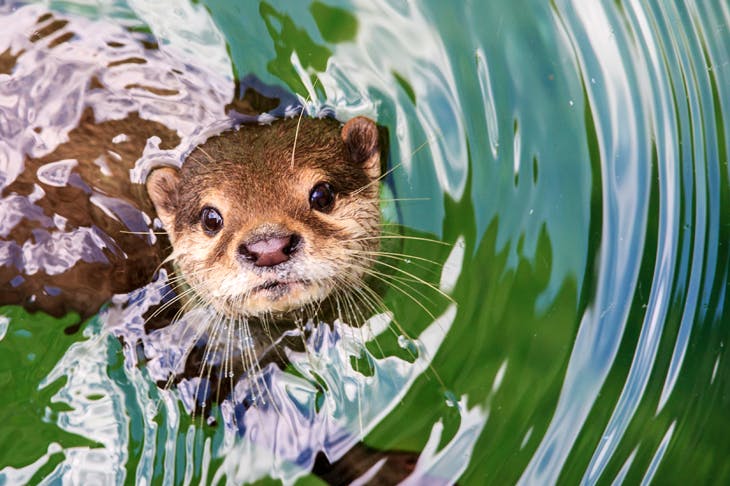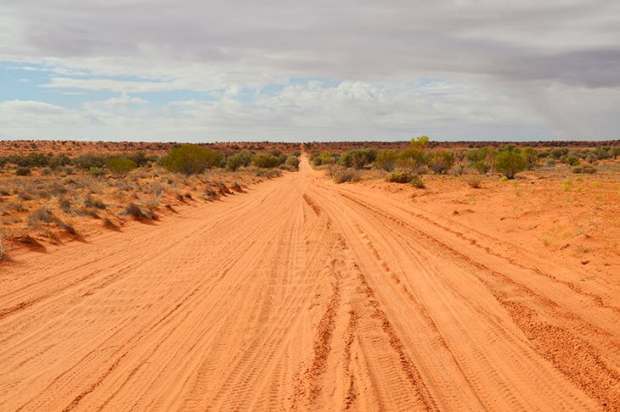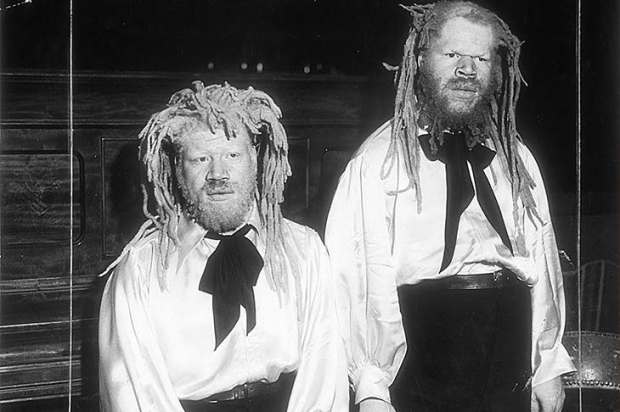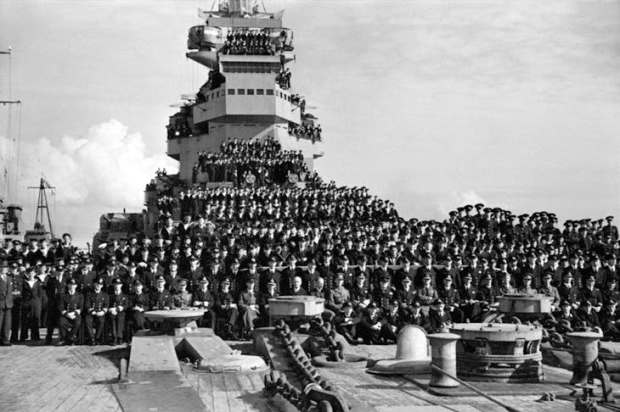Thanks to Henry Williamson and Gavin Maxwell I have spent hours in the company of otters, though I have only seen two. The first was harried, fleeing towards us along a shoreline, apparently pursued by spirits. From The Otters’ Tale I now know that was a period, the late 1980s, when the otter was heading for British extinction. It was a young adult, menaced by hunger and the weather. The second otter, a decade ago, was one of a resurgent population, erupting out of the river Teifi, in Wales. A whiskered face popped out of the torrent and stared.
‘Otter!’ we shouted, delighted. The animal’s expression suggested ‘Humans!’ — but that is the danger of otters. The creature was a flourish of existence, bobbing in the rapids with the apparent joy of a child on a windy day. Otters might have been framed by nature to bring out the anthropo-
morphist in any who come close to them. Look at Maxwell, walking his Mijbil through London on a leash.
To live near otters must be marvellous, though; in Simon Cooper’s telling, the animals are loud, playful and rapacious. Cooper lives in a Hampshire watermill where his trout attract otters. He names a female ‘Kuschta’ after a native American word meaning ‘root people’, shape-shifting beings who might be roots, otters or humans. This is appropriate, as the Kuschta Cooper describes is sometimes an observed subject and sometimes, less successfully, an imagined character. (Williamson and ‘BB’ rendered animals so well through strict avoidance of human traits. Perhaps the task was easier in their less anthropo-
centric times.) Following Williamson’s model, Cooper follows Kuschta’s search for territory, her raids on Cooper’s lake, her mating and parenting.
Hunted until 1978, then poisoned by organophosphates until 1992, otters have survived thanks to the tenacity of their supporters. Cooper dedicates his book to ‘those who tirelessly campaigned to save the otter from extinction’. There are now populations in every county.
It is easy to share Cooper’s affection for his heroine as she thumps into his lake, coughs and snorts when she misses a fish, eeks and squeals at her cubs. The cubs must be taught to swim — she noses them around the shallows — and to hunt; she provides fish for practice, ‘say a fingerling trout’, Cooper writes, which she releases into a shallow pool where the ‘annoyingly hopeless pups’ eventually wear it down.
Cooper is wonderfully fond of fish. Bullheads ‘bustle about the river, all muscle and spiky aggression’. Grayling smell of thyme. Pike ‘deserve a better press’; ‘it is the few solitary pike that keep a river healthy’, he observes, controlling duck populations and picking off diseased and weakened fish. The same logic has the otter culling her offspring down to a family she can feed. The moment when she turns on one is horrifying. The reasons for mothers’ choices in these cases are unknown. After four nights of listening to the screams of the ostracised pup, Cooper drives the rest of the family away from their catch, hoping the outcast will feed.
He ran up to me, stopping at my feet, rose up on his hind legs, opened his mouth, drew back his lips over his yellow teeth and, whilst clawing the air with his front paws, screamed at me without pause. It was horrible. It was rabid.
Cooper retreats. He finds the pup’s body the next morning.
Apart from tolerating the otters’ predation of his trout, and building an artificial holt in the same spirit in which one might put up an nest box, Cooper does not interfere with his subjects. He provides remarkable descriptions of hunting (otters use their whiskers to sense the vibrations of fish), and the mating process, a furious round of playing, fighting and coupling.
Cooper is a chalk stream conservationist, and makes a charming guide. He can be an unconfident writer, quick to reach for the comfort of cliché. (The best line is Izaak Walton’s: ‘I am, Sir, a Brother of the Angle, and therefore an enemy of the Otter; for I hate them perfectly, because they love fish so well.’) But Cooper knows more about otters than Williamson or Maxwell, and perhaps more than anyone about the riverine life of the Wallop Valley.
Got something to add? Join the discussion and comment below.
Get 10 issues for just $10
Subscribe to The Spectator Australia today for the next 10 magazine issues, plus full online access, for just $10.
You might disagree with half of it, but you’ll enjoy reading all of it. Try your first month for free, then just $2 a week for the remainder of your first year.














Comments
Don't miss out
Join the conversation with other Spectator Australia readers. Subscribe to leave a comment.
SUBSCRIBEAlready a subscriber? Log in